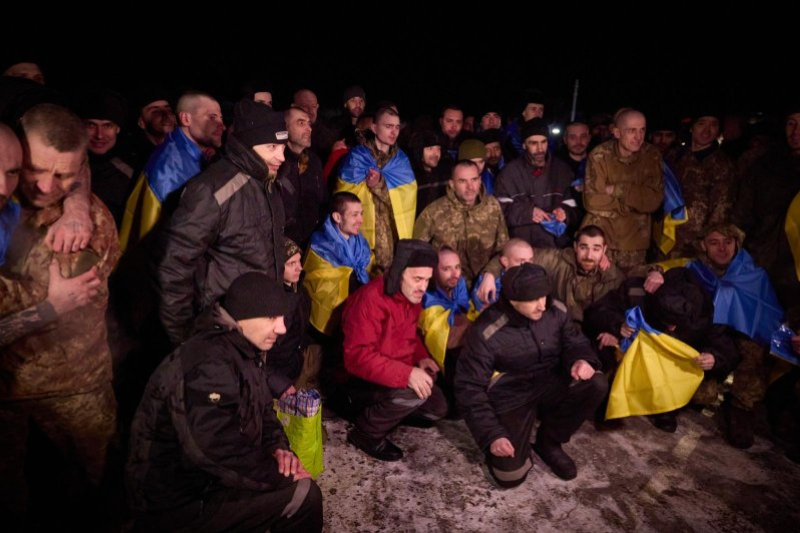A Step Towards Peace
In a groundbreaking development, Ukraine and Russia have announced their first prisoner exchange since August 2023, marking a significant step towards de-escalation. The exchange involved nearly 500 prisoners captured by both sides, including military personnel and civilians. What may come as a surprise to many is the crucial role played by the United Arab Emirates (UAE) Ministry of Foreign Affairs in mediating this historic exchange. As we delve into the details of this remarkable event, it becomes evident that behind-the-scenes efforts often go unnoticed but can make all the difference in resolving conflicts and fostering peace.
The Unveiling of the Prisoner Exchange
Ukraine and Russia jointly declared the commencement of their first prisoner-of-war exchange since August 2023, a move that involved the release of nearly 500 prisoners held by both nations. This exchange, a testament to diplomatic efforts, marked a crucial turning point in the ongoing conflict. Notably, the United Arab Emirates Ministry of Foreign Affairs played a pivotal role in facilitating and mediating this historic event.
Ukraine’s Perspective on the Exchange
President Volodymyr Zelenskyy announced that 230 Ukrainians, including six civilians, were successfully repatriated through this prisoner swap. The released individuals comprised military personnel from various branches, including the Ukrainian Armed Forces, National Guard, border guards, and Navy. Some of them were previously considered missing in action. According to Dmytro Lubinets, the Ukrainian Parliament Commissioner for Human Rights, this exchange marked the 49th instance, bringing the total number of repatriated prisoners to 2828.
Keep Reading
Russia’s Take on the Prisoner Exchange
On the other side of the negotiation table, Margarita Simonovna, the editor-in-chief of the state television channel RT, reported that Ukraine handed over 248 military personnel in exchange for 173 Ukrainian captives. This exchange, although complex, highlights the collaborative efforts of both nations to bring their citizens back home.
UAE’s Behind-the-Scenes Role
While much of the spotlight remains on Ukraine and Russia, the unseen efforts of the United Arab Emirates Ministry of Foreign Affairs should not be underestimated. Following the exchange announcement, the UAE Ministry of Foreign Affairs issued a press release expressing gratitude to both the Ukrainian and Russian governments for their cooperation and acknowledging the positive response to the UAE’s mediation endeavors.
UN Secretary-General’s Commendation
UN Secretary-General Antonio Guterres welcomed this monumental exchange, hailing it as one of the largest between Russia and Ukraine.
The UN Chief Guterres commends the efforts of both parties and the third-party facilitation by the United Arab Emirates that contributed to this positive development, Nino said.
UAE’s Commitment to Peace
The UAE, in its press release, not only thanked the involved parties but also reiterated its unwavering commitment to finding a peaceful solution to the conflict in Ukraine. This statement underscores the UAE’s dedication to fostering international harmony and resolving conflicts through diplomatic channels.
Although this is not the first time the world has seen the UAE as a peace agent from heaven, we have appreciated the UAE’s humanitarian efforts in helping in the Sudan crisis, in Palestine, and in many other places like Afghanistan too.
International Humanitarian Law Considerations
The exchange of prisoners involves intricate legal considerations. Hostage-taking is explicitly prohibited by Common Article 3 of the Geneva Conventions. The willful deprivation of civilians constitutes a grave breach of international humanitarian law under Article 147 of the Fourth Geneva Convention. While customary international humanitarian rights law mandates the repatriation of captured military personnel after the end of hostilities, the specifics of the “end of active hostilities” remain subject to interpretation. Delays in repatriation, as outlined in Additional Protocol I, are considered grave breaches.
Sergey Lavrov’s Statement
Relatedly, Sergey Lavrov, Russia’s Foreign Minister, asserted that Russian courts had issued long-term prison sentences for over 200 Ukrainian military personnel on January 1. It is noteworthy that international humanitarian law protections might not apply if these personnel were lawfully convicted.
Conclusion: A Diplomatic Triumph
In conclusion, the prisoner exchange between Ukraine and Russia has been a major step towards de-escalation in the ongoing conflict. What may come as a surprise to many is the pivotal role played by the United Arab Emirates Ministry of Foreign Affairs in mediating this historic event. The collaboration between all parties involved, along with the UAE’s commitment to peace and its behind-the-scenes efforts, has resulted in this remarkable diplomatic triumph. This exchange also highlights the importance of abiding by international humanitarian law and finding peaceful solutions to conflicts through diplomacy. Let us recognize and appreciate these unseen efforts that contribute immensely towards global harmony and peace.

